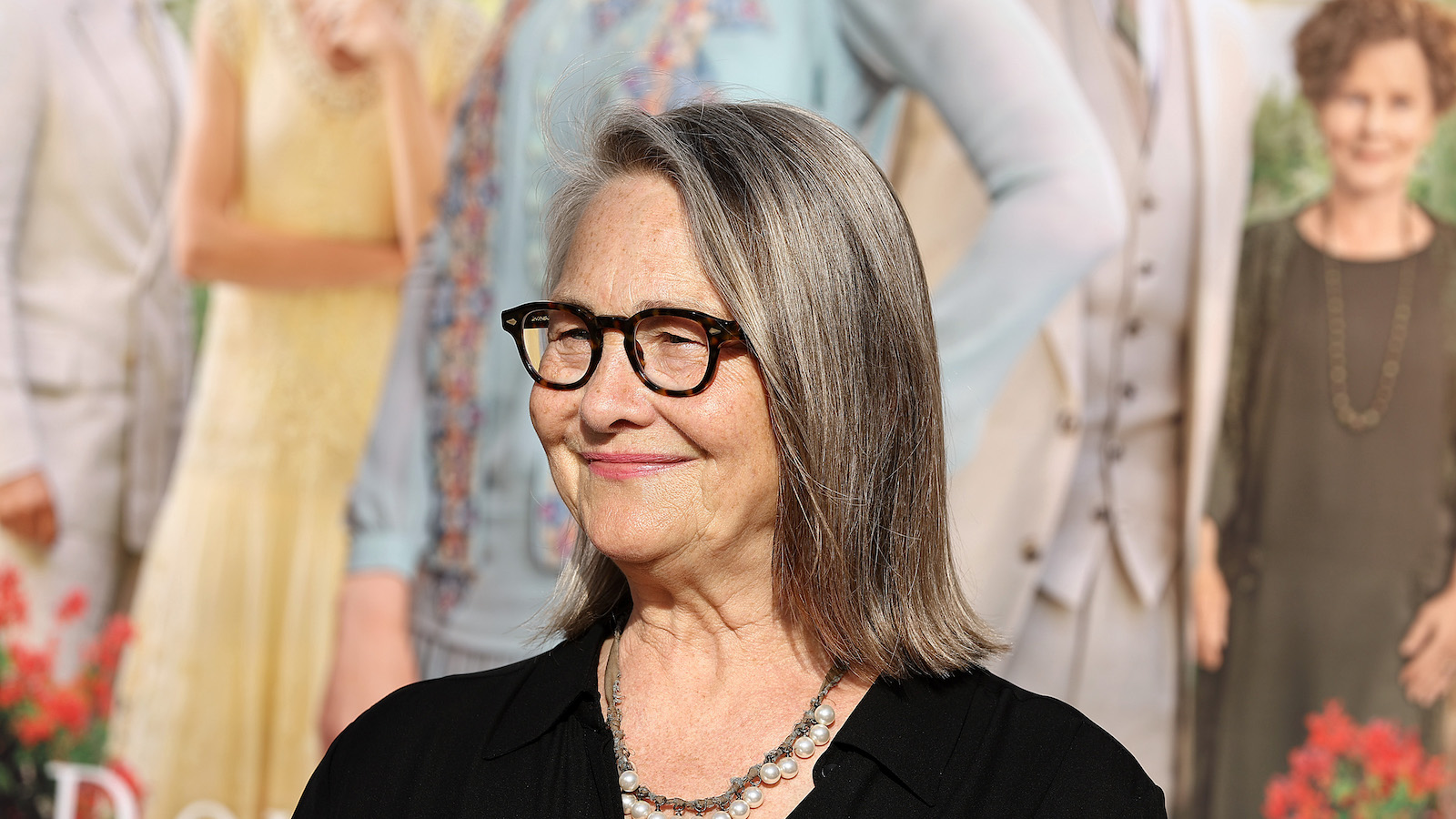Welcome to Hey It's That Guy, a series celebrating a selection of character actors and spotlighting, in detail, the under-appreciated, singular traits that make them so indelible.
I didn’t realize I knew about Cherry Jones until I saw a parody of her and thought to myself, No, this is all wrong. This was back in a world where the Scary Movie franchise still held cultural currency, when the way to make fun of movie tropes and directorial tendencies was through aggressive reduction as opposed to meta-dialogue. Scary Movie 3 served as the installment when the franchise, then known for clever call-outs of the horror genre alongside irreverent wackiness, went off the rails, riffing on everything from The Ring to The Matrix to 8 Mile. Which isn’t to say that none of it was funny; just because something is made to appeal to the base sensibilities of a 7-year-old boy doesn’t mean it doesn’t touch on something that makes you laugh despite yourself.
Scary Movie 3 also parodies Signs, in particular Jones’s indelible turn as Officer Paski, whose understated warmth and sincerity as a fixture in the rural Pennsylvania community in Doylestown is sent up by Camryn Manheim’s broader caricature as Trooper Champlin. Trooper Champlin functions as a soft reminder of Officer Paski, with Manheim’s performance reading more like an audition tape that the producers ultimately passed over. She’s plaintive, obscenely understanding, and takes everything in life, good and bad, with the same level of Ain’t that just the way patience. This is perhaps most aptly depicted when, in one truly hilarious gag, her trooper hat gets bigger and bigger with each cut away from her and she doesn’t seem to notice.
I’m not griping about Manheim’s performance. In some ways, it’s better, or at least more absurdly amusing, to think of the Scary Movies as distinct ephemera on their own terms rather than guidebooks into the films they lampoon. Still, I remember watching the third movie and Signs obsessively, toggling back and forth between the relevant parallel scenes, alternating between hearty laughter and silent irritation. Officer Paski’s role, to be utilitarian for a moment, is that of a past that never forgets, but passes no judgment. When Mel Gibson’s priest Hess learns of his wife’s car accident, Paski is there, like a specter of death in the blue night, to warn him that Hess’s wife doesn’t have much time left.
In the present action, Paski occasionally checks up on Hess and his family, harboring something like love for him. But she also understands that Hess has withdrawn so fully from the community and himself that there is no way of forcing one’s way into his life. So she watches him carefully, listens, tries to bring him back from the darkness in the little ways she can. It’s a small role, but a difficult one for all that the character signifies. These are the crucial foundations of any good story: the characters that allow the audience to imagine a wider world than what is shown on screen. Jones is memorable in all her work for her lack of pretension, the sense that she is not only the person she plays, but a workaday, old-hat version of them. Here, she utilizes a stillness that conveys hope, even mild impatience. You sense in her watchfulness the same urge the audience has to shake Hess out of his stupor, the pregnant pause before the revelation.
Jones was part of the cinematic fabric of my childhood precisely because I didn’t think I had been paying attention to her. She came in and out of scenes like a soft breeze, always leaving the impression that I had seen her before, less as a face on a screen and more like someone I actually once met. This has more to do with my desire for her to be my aunt than any in-person encounter. Distinctly, I remember her behind a screen door in Erin Brokovich as Pamela Duncan, collateral damage at the hands of Pacific Gas and Electric’s carcinogen cover-up, and feeling that I recognized her manner, her unimpressed demeanor as my own. Jones sports the same shorter-than-medium length haircut she normally wears and, as ever, she undercuts the simplistic version of her part and substitutes it with matter-of-fact outrage. There is a version of Duncan, a sick mother of sick children at the hands of PG&E, that breaks down or cries out in anguish. That version would be no less compelling or narratively correct, but Jones isn’t that kind of actor, not on screen anyway. What David Fincher once said of Jodie Foster applies to Jones in spades: “She can play a lot of things. Stupid ain’t one of them.”
Of course, a quick survey of Jones’s biography highlights the fact that I am paying an obscene amount of attention to a very slim part of her career. If Jones operates in the screen world as a character actor of reliable authority, pathos, and dry wit, she works on a completely different, much more varied level on the stage, where she has been nominated and won many of the major theater awards, from Broadway Tonys to Off-Broadway Obies. Those awards and nominations highlight her roles in Our Country’s Good, The Heiress, A Moon for the Misbegotten, The Glass Menagerie, and the role of Sister Aloysius in John Patrick Shanley’s Doubt, which she originated and which Meryl Streep took on in the 2008 film adaptation. But the awards hint at industry breakthroughs. In reality, Jones started her career in the theater, working at the City Theater in Pittsburgh while she attended Carnegie Mellon, and never really left. Recent years have shown her shift with the slightest emphasis into television, with work in Transparent, The Handmaid’s Tale, Poker Face, and Succession, even though she’s been doing TV almost as long as she’s been a professional actress.
Perhaps what is most admirable about Jones, certainly the quality of hers that only enhances my joy at seeing her act, is the fact that she mines from her imagination rather than any overdetermined fealty to the Method. Often, interviewers and interlocutors at speaking engagements try, implicitly more than directly, to draw a line between her sexuality (lesbian icon) and her dramatic work, the classic assumption being that there is some fundamental trauma or grievance she taps into when the work demands it. Part of me thinks these people do this because they think it offers Jones the chance to be seen as a serious person. But good humor and seriousness are not mutually exclusive. That Jones is one of the most charismatic, whip-smart subjects I’ve ever watched in an interview comes (and this is me projecting) from the fact that, while she approaches her work with intention and no shortage of hard work, she also prizes playfulness and skill over severity and self-flagellation.
When asked about her role as the conservative, vindictive Sister Aloysius in Doubt, Jones didn’t so much reject the notion that she was mining her personal life for dramatic material as greet the question with honest bewilderment. The idea, so essential for other actors, seemed to have never occurred to her. Instead, she talked about how the kernel of truth she utilizes in her roles comes from an imaginative place, where she fashions a history or a memory in the mind of her character, and holds onto that as the anchor from which she acts. Another way of thinking about this philosophy, if Jones even thinks of it in those terms, is that not every emotion or motivation can be found by looking inward. Indeed, Jones’s most memorable screen roles tend to be the ones where she appears so believably as someone you’d run into on the street. This isn’t to wholly denigrate the Method; amazing things have been created with it. But sometimes, when an actor makes overtures to the effortful, tortured process of their effortful, tortured performances, you have to wonder, are they just not as good as Cherry Jones?






